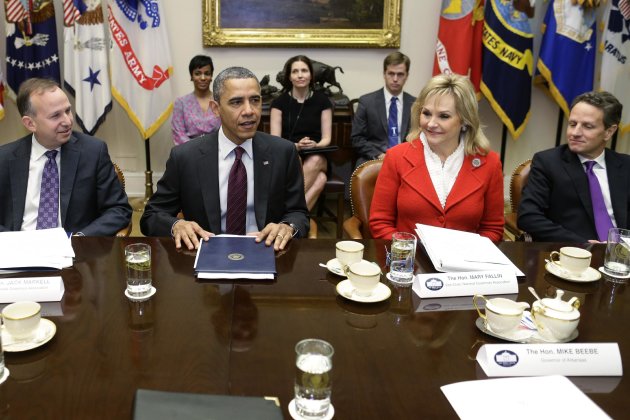Highlights of White House, GOP budget plans
By | Associated Press – 15 hrs ago
 Associated
Press/Charles Dharapak - President Barack Obama, flanked by National
Governors Association (NGA) Chairman, Delaware Gov. Jack Markell, left,
and NGA Vice Chair, Oklahoma Gov. Mary Fallin, meets with
Associated
Press/Charles Dharapak - President Barack Obama, flanked by National
Governors Association (NGA) Chairman, Delaware Gov. Jack Markell, left,
and NGA Vice Chair, Oklahoma Gov. Mary Fallin, meets with
The Obama administration and House Republicans
have unveiled their opening offers in talks to avoid the so-called
fiscal cliff. Details are scant but the White House estimates its plan
would carve $4.4 trillion from the deficit over the coming decade,
including previously enacted cuts ($1 trillion) and savings from reduced
costs for overseas military operations ($800 billion), as well as
interest payments on the national debt ($600 billion).
The two plans both draw upon ideas from 2011 talks between President Obama and House Speaker John Boehner, including a secret plan by top Obama aide Rob Nabors that was made public by author and Washington Post writer Bob Woodward.
___
TAXES
Obama: Increase taxes by $1.6 trillion over 10 years, raised by permitting tax rates on individual income exceeding $200,000 and family income over $250,000 to return to Clinton-era levels of 36 and 39.6 percent, up from 33 and 35 percent now. Increase taxes on dividend income and reduce the value of deductions and exemptions for those earning above $200,000 and 250,000. Renew the 2 percentage point payroll tax holiday or a similar tax cut for workers. Return taxes on large estates to 2009 levels. Permits tax reform to replace the existing code so long as it maintains the $1.6 trillion tax hike.
House GOP:
Increase taxes by $800 billion over 10 years, raised through a
comprehensive overhaul of the tax code that would curb various
unspecified tax breaks while lowering tax rates overall. Extend all
expiring Bush-era tax cuts
on income, investments, married couples and families with children.
Maintains the estate tax at current, more generous levels exempting
estates up to $5.1 million from tax and sets a top rate of 35 percent.
Permits payroll tax cut to expire.
Obama 2011: Raise taxes by $1.2 trillion over 10 years through
overhauling the tax code along similar lines advocated by House
Republicans, including lowering each tax rate by reducing tax breaks and
deductions.___
HEALTH CARE
Obama: Cut $350 billion over 10 years from federal health care programs Medicare and Medicaid, including lower Medicare drug costs and other cost curbs on health care providers.
House GOP:
Cut $600 billion over 10 years. Includes unspecified cuts to health
care providers and assumes an increase in the eligibility age for
Medicare and increased Medicare costs for higher-income beneficiaries.
___
OTHER SPENDING CUTS
Obama: Cut the deficit by $250 billion through other spending cuts and new fees. Options include requiring federal workers to contribute more to their retirement, cut farm subsidies, increase airline security fees, overhaul Postal Service operations, and increasing fees on some enrollees in the military's Tricare health care plan. Leaves in place existing "caps" on agency budgets passed by Congress each year.
House GOP: Deficit cuts of $300 billion through such cuts and fees from miscellaneous programs. Cut another $300 billion over the decade from agency operating budgets.
Obama 2011: Cut $200 billion from such programs. Several items on the list have been subsequently used to pay for other legislation.
___
GOVERNMENT INFLATION MEASURE:
Obama: No proposal.
House GOP: Reduce deficits by $200 billion over 10 years by replacing the current inflation adjustment for Social Security and income tax brackets with a less generous "chained CPI" that, on average, is 0.3 percentage points less than the current measure. Doing so would reduce Social Security cost-of-living increases and cause a greater portion of taxpayer income to be taxed at higher rates.
Obama 2011: Apply less generous inflation measures to both Social Security and tax brackets, but boost benefits for the oldest Social Security beneficiaries with low incomes.
___
NEW SPENDING
Obama: $200 billion in new economic "stimulus" initiatives, including payroll tax
cuts, continued write-offs of business equipment purchases, extended
unemployment benefits, help for borrowers "under water" on their
mortgages, and new spending on infrastructure.
House GOP: No proposal.Obama 2011: $43 billion to extend unemployment benefits to the long-term jobless.
___
DEBT LIMIT
Obama: Permit the president to
obtain increases in the government's borrowing cap, currently set at
$16.4 trillion, without approval by Congress.
House GOP: Retain longstanding requirement that debt limit increases be enacted by Congress.
Obama 2011: Immediate unspecified increase in the debt limit and additional increase not subject to congressional approval.
No comments:
Post a Comment